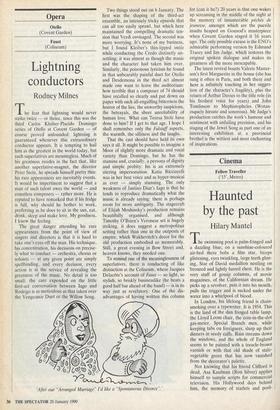Opera
Otello (Covent Garden) Faust (Coliseum)
Lightning conductors
Rodney Milnes
The fear that lightning would never strike twice — or thrice, since this was the third Carlos Kleiber-Placido Domingo series of Otello at Covent Garden — of course proved unfounded: lightning is guaranteed whenever this extraordinary conductor appears. It is tempting to hail him as the greatest in the world today, but such superlatives are meaningless. Much of his greatness resides in the fact that, like another superlative-magnet, the director Peter Stein, he spreads himself pretty thin: his rare appearances are inevitably events. It would be impertinent to suggest that a man of such talent owes the world — and countless composers — rather more. He is reputed to have remarked that if his fridge is full, why should he bother to work, preferring as he does to sit in the sun, eat, drink, sleep and make love. My goodness, I know the feeling.
The great danger attending his rare appearances from the point of view of singers and directors is that it is hard to take one's eyes off the man. His technique, his concentration, his decisions on precise- ly what to conduct — orchestra, chorus or soloists — at any given point are simply spellbinding, and every decision, every action is at the service of revealing the greatness of the music. No detail is too small: the care expended on the little first-act conversation between Iago and Rodrigo is as meticulous as that taken over the Vengeance Duet or the Willow Song.
Two things stood out on 6 January. The first was the shaping of the third-act ensemble, an intensely tricky episode that can all too easily sprawl, but which here maintained the compelling dramatic ten- sion that Verdi envisaged. The second was more worrying. It's none of my business, but I found Kleiber's thin-lipped smile while conducting the Credo distinctly un- settling: it was almost as though the music and the character had taken him over. Similarly, the poisonous lyricism he found in that unbearably painful duet for Otello and Desdemona in the third act almost made one want to leave the auditorium: how terrible that a composer of 74 should have recalled so clearly and put down on paper with such all-engulfing bitterness the horror of the lies, the unworthy suspicions, the betrayals, the sheer unreliability of human love. What can Teresa Stolz have done to him? If I get to that age, I hope I shall remember only the Falstaff aspects, the warmth, the silliness and the laughs.
That the cast should have held its own says it all. It might be possible to imagine a Moor of slightly more dramatic and vocal variety than Domingo, but he has the stamina and, crucially, a persona of dignity and simple probity: his is an extremely stirring impersonation. Katia Ricciarelli was in her best voice and as hyper-musical as ever — simply stunning. The only weakness of Justino Diaz's Iago is that he tends to reproduce dramatically what the music is already saying: there is perhaps room for more ambiguity. The stagecraft of Elijah Moshinsky's production remains beautifully organised, and although Timothy O'Brien's Veronese set is hugely striking, it does suggest a metropolitan setting rather than one in the outposts of empire, which Wakhevitch's decor for the old production embodied so memorably. Still, a great evening in Bow Street and, heaven knows, they needed one.
To remind one of the meaninglessness of superlatives, there is conducting of like distinction at the Coliseum, where Jacques Deladite's account of Faust — so light, so stylish, so briskly businesslike (he beats a good half bar ahead of the hand) — is in its way just as revelatory. One of the dis- advantages of having written this column 'After our "Arranged Marriage" I'd like a "Spontaneous Divorce".' for (can it be?) 20 years is that one wakes up screaming in the middle of the night at the memory of innumerable peches de jeunesse, amongst which are the puerile insults heaped on Gounod's masterpiece when Covent Garden staged it 16 years ago. The only possible excuse is the ENO's admirable performing version by Edmund Tracey and Ian Judge, which restores the original spoken dialogue and makes its greatness all the more inescapable.
The latest revival boasts Valerie Master- son's first Marguerite in the house (she has sung it often in Paris, and both there and here is infinitely touching in her sugges- tion of the character's fragility), plus' the return of Arthur Davies to the title role (in his freshest voice for years) and John Tomlinson to Mephistopheles (Wotan- esquely hirsute and sonorous). Mr Judge's production catches the work's humour and sentiment with unfailing precision, and his staging of the Jewel Song as part one of an interesting exhibition at a provincial brothel is the wittiest and most enchanting of inspirations.


















































 Previous page
Previous page